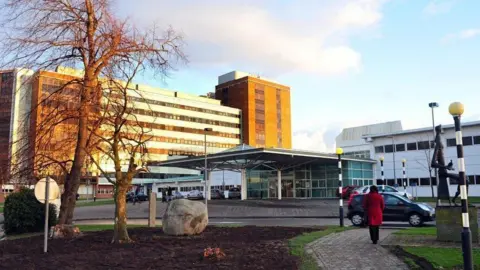Border closures had major impact on hospital staff, Covid Inquiry told
 Pacemaker
PacemakerAltnagelvin Hospital's close proximity to Londonderry’s border with the Republic of Ireland created problems for staff and patients during the coronavirus pandemic, the UK Covid-19 Inquiry has heard.
The former medical director of the Western Health Trust, Dr Catherine McDonnell, said border closures had a major impact on staff who lived in County Donegal.
Dr McDonnell was giving evidence at the UK Covid-19 public inquiry on Monday.
She also said being at the centre of two jurisdictions meant different rules and lockdown dates had led to a spike in Covid-19 cases in the north west.
"At times during the pandemic, that border was closed, so the trust was required to provide paperwork to staff to identify themselves as essential travellers, and similarly for patients who were coming across the border to look for services," she said.
Dr McDonnell was giving evidence remotely to the inquiry, which is currently examining the impact of the pandemic on the healthcare systems in each of the UK's four nations.
She added: "Because they were two jurisdictions, the guidance and the restrictions often varied.
"That, particularly in the first surge, meant it was extremely confusing for staff because there was so much rapid change and they were hearing some conflicting messages.

"I also believe that we had particularly... sometimes not quite in step with the rest of the region, in terms of our surges and our spikes, and that might have been to do with some of the differences in terms of lockdown.
"So if we unlocked early, we would get a footfall of residents across the border over to enjoy our restaurants and our pubs, and I think that might have contributed to some of our particular peaks," said Dr McDonnell.
She said Altnagelvin had aimed to increase the number of Intensive Care Unit (ICU) beds it had from 10, but that the issue was getting the staff needed to manage them.
The hospital had been successful in establishing practices aimed at lowering infection rates and making visiting as safe as possible, which were put in place by a strong clinical leadership team, she said.
However, staff had faced high intensity over two years and Altnagelvin had been overwhelmed in the fifth phase of the pandemic, said Dr McDonnell.
The omicron variant of coronavirus had "spread like wildfire" during December 2021 to February 2022, leading to a significant loss of staff through illness and creating "the most chaotic moment" of the pandemic for the north-west, she said.
The former medical director said planning around guidance for clinicians in their decision-making during a pandemic should be done now, "rather than waiting to we get into the eye of the storm".
"We can never have too much guidance, whether it is regional or national, in terms of helping us to explore these difficult topics, and help us and direct us and guide us to do the right thing by each individual patient," she said.
